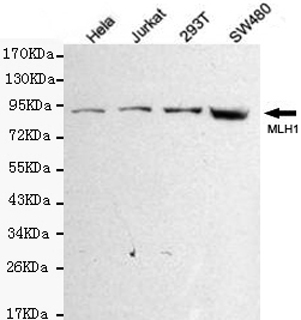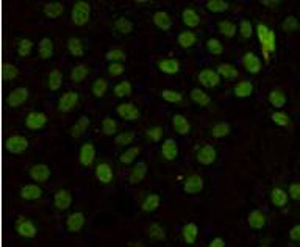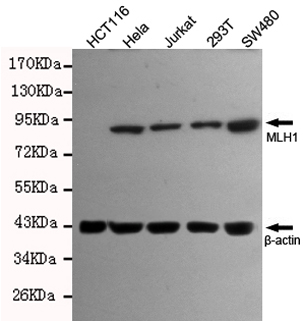-
Product Name
Anti-MLH1 (4C1) Mouse antibody
- Documents
-
Description
MLH1 (4C1) Mouse monoclonal antibody
-
Tested applications
WB, IHC-P, ICC/IF
-
Species reactivity
Human, Monkey
-
Isotype
Mouse IgG1
-
Preparation
Antigen: Purified recombinant fragment of MLH1 (aa381-483) expressed in E. Coli.
-
Clonality
Monoclonal
-
Formulation
Ascitic fluid containing 0.03% sodium azide.
-
Storage instructions
Store at 4°C short term. Store at -20°C long term. Avoid freeze / thaw cycle.
-
Applications
WB: 1/500 - 1/2000
IHC: 1/200 - 1/1000
ICC: 1/200 - 1/1000
ELISA: 1/10000
-
Validations

Western blot detection of MLH1 in Hela,Jurkat,293T and SW480 cell lysates using MLH1 mouse mAb (1:500 diluted).Predicted band size:85KDa.Observed band size:85KDa.

Immunocytochemistry staining of HeLa cells fixed in 1% Paraformaldehyde and using MLH1 mouse mAb (dilution 1:100).

Western blot detection of MLH1 in SW480,293T,Jurkat and Hela cell lysates using MLH1 mouse mAb (1:500 diluted).Predicted band size:85KDa.Observed band size:85KDa.
-
Background
Swiss-Prot Acc.P40692.DNA-mismatch repair (MMR), a conserved process that involves correcting errors made during DNA synthesis, is crucial to the maintenance of genomic integrity. Lack of a functional DNA-mismatch repair pathway is a commoncharacteristic of several different types of human cancers, either due to anMMR gene mutation or promoter-methylation gene silencing. MLH1 is a human homolog of the E. coli DNA mismatch repair gene mutL, consistent with the characteristic alterations in microsatellite sequences (RER+ phenotype) found in hereditary nonpolyposis colon cancer (HNPCC). MLH1 is an integralpart of the protein complex responsible for mismatch repair expressed inlymphocytes, heart, colon, breast, lung, spleen, testis, prostate, thyroid andgall bladder, and is methylated in several ovarian tumors. Loss of MLH1 protein expression is associated with a mutated phenotype, microsatellite instability and a predisposition to cancer. In hereditary nonpolyposis colorectalcancer (HNPCC), an autosomal dominant inherited cancer syndrome that signifies a high risk of colorectal and various other types of cancer, the MLH1 gene exhibits a pathogenic mutation. Inactivation of the MLH1 gene causes genome instability and predisposition to cancer. MLH1 also plays a role in meiotic recombination.
Related Products / Services
Please note: All products are "FOR RESEARCH USE ONLY AND ARE NOT INTENDED FOR DIAGNOSTIC OR THERAPEUTIC USE"
